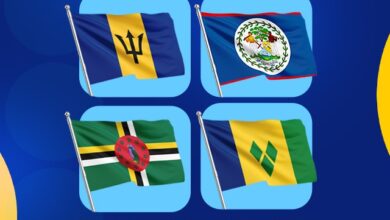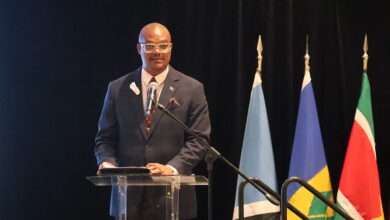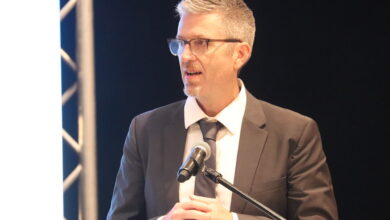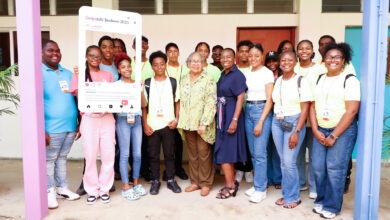(CARICOM Secretariat, Turkeyen, Greater Georgetown, Guyana) The Twenty-Third Meeting of the Council for Human and Social Development (COHSOD) on Children and Youth was convened under the theme: Charting our future: An integrated development agenda for children and youth, at the Princess International Hotel, Providence East Bank Demerara, Guyana on 10-11 July 2012. The meeting was chaired by the Hon. Dr Frank Anthony, Minister of Youth, Culture and Sport, Guyana.
In attendance were: Senator the Hon. Malaka Parker, Parliamentary Secretary, Ministry of Health, Social Transformation, Consumer Affairs and Local Government, Antigua and Barbuda; Hon. Stephen Lashley, Minister of Family, Culture, Sports and Youth, Barbados; Hon Gloria Shillingford, Minister for Social Services, Community Development and Gender Affairs, Dominica; Hon. Sylvester Quarless, Minister of Social Development and Labour, Grenada; Hon. Dr. Frank Anthony, Minister of Culture, Youth and Sports, Guyana; Hon. Bheri S. Ramsaran Minister of Health, Guyana; Hon. Colin M. Riley, Minister of Education, Youth Affairs and Sports, Montserrat; Hon. Alvina Reynolds, Minister for Health, Wellness, Human Services and Gender Relations, Saint Lucia; Hon. Frederick Stephenson, Minister of National Mobilisation, Social Development, the Family, Persons with Disabilities, and Youth, St Vincent and the Grenadines; Hon. Ismanto Adna, Minister of Sport and Youth Affairs, Suriname.
Also in attendance were: Permanent Secretaries, Directors of Youth and representatives of regional institutions and international organisations including the Foundation for the Development of Caribbean Children (FDCC); the United Nations Children Fund (UNICEF); UNAIDS; the Commonwealth Youth Programme (CYP); International Labour Organizations ; UN Women; International Organisation for Migration (IOM); United Nations Population Fund (UNFPA) and the Inter-American Development Bank (IDB).
OPENING CEREMONY
At the opening ceremony, statements were made by Dr Frank Anthony, the CARICOM Secretary-General, Ambassador Irwin LaRocque; Mr Suleiman Brainmoh, UNICEF Representative; Mr Dwayne Gutzmer, Dean of the CARICOM Youth Ambassador Corps; and Ms Myrna Bernard, Officer in Charge of Human and Social Development, CARICOM Secretariat.. During the opening ceremony, two ten year-olds – Loren Black and Jada Campbell – presented a poem, titled, It couldn’t be done, while Nicketa Liverpool, Dominic Alleyne and Jamal Stewart presented a dance to the Michael Jackson hit song titled Heal the world.
Dr Anthony highlighted the importance of collaboration and an integrated approach in dealing with children and youth issues, and stressed that the ultimate aim of working with and for children was to make the Region a better place for them to live, grow and develop. He added that the fact that Member States were very well represented at the meeting was a clear indication of their conviction that a holistic approach was absolutely necessary to effectively implement the regional priority actions pertaining to children and youth. He said the increase in child sexual abuse, particularly intra-familial abuse in the home, was cause for concern and that a collaborative approach to solving the problem was needed. “No one government, organization or agency can do it alone; it has to be a collaborative effort with all relevant stakeholders, school, home, church, community groups, institutions making a contribution,” the Guyana Minister of Youth Culture and Sport concluded.
The CARICOM Secretary-General highlighted the problem of incest and child molestation, implying that this practice was not only deeply entrenched in traditions and sub-cultures of some parts of the region, but was very often shrouded in a veil of silence and secrecy. He urged Ministers with responsibility for children and youth to “challenge concertedly and decisively the deeply entrenched cultural practices and norms that condone violence and violate the rights of our children and youth.” The CARICOM Secretary-General called for greater investment to be made in evidenced-based policies and sustainable social programmes to address the social determinants that perpetuate violence against children and youth.
Mr Suleiman Braimoh added that despite the progress made in addressing children’s issues, there was still significant work to be done in protecting the Region’s children. He pointed to inequities in the situation of children associated with geographical location and in child outcomes linked to wealth, educational attainment and other variables, and suggested that the COHSOD was in a unique position to provide leadership to help Member States move forward.
Jamaica’s Dwayne Gutzmer, drawing on one of his country’s rich sayings – “one han cyan clap,” – emphasized the need for an intergenerational approach to addressing children and youth issues. He told the COHSOD meeting that his peers had asked him to deliver the clear message that they wanted to be engaged from the inception and planning stage of programmes, policies and activities that were geared toward their development.
Ms Bernard stated that the Meeting, in addressing issues related to Children and Youth, recognised that charting the path to sustainable prosperity and well-being must including priority attention to developing our children and youth in ways which adequately prepare them to contribute to, and benefit from social and economic development.
Dr Morella Joseph, in giving the vote of thanks, noted that the sterling contributions of development partners, including UNICEF, in advancing the Community’s progress on implementing the Regional Framework for Action for Children and the targets set for 2015.
TOWARDS AN INTEGRATED DEVELOPMENT AGENDA FOR CHILDREN AND YOUTH
COHSOD received and discussed a proposal for development of an integrated development agenda to treat with the issues of children and youth. The presentation provided perspectives on two major regional structural frameworks for children and youth; the Regional Framework for Action for Children and the 2012 CARICOM Youth Development Action Plan. The presentation emphasized the importance of considering these frameworks in an integrated manner. COHSOD agreed that an integrated treatment of the regional agendas for children and Youth was important and recommitted to the establishment and operation of inter-sectoral committees at the national level. Recognizing the need to address gender issues, COHSOD agreed to mainstream gender in youth and children’s agendas. COHSOD also decided to promote the use of the regional gender differentials framework at the National level.
REVIEW OF THE REGIONAL FRAMEWORK FOR ACTION FOR CHILDREN
The COHSOD acknowledged the progress which has been made in implementing the Regional Framework for Action for Children – particularly in the areas of Early Childhood Care and Development (ECD), Child Rights, Child protection and Child Health. They also applauded the efforts of the CARICOM Secretariat in facilitating training and certification for teachers and caregivers in ECD with the Caribbean Vocational Qualification (CVQ). COHSOD reiterated the importance of the Regional Framework for Action for Children in guiding actions and capturing data relevant to the overall well-being of the Caribbean Child and urged Member States to make use of the Framework. COHSOD also urged the CARICOM Secretariat to work with regional partners in developing a strategy to assist Member States to develop protocols for the mandatory screening of young children for the early detection of developmental challenges to inform timely response interventions. COHSOD further urged Member States to ensure that the necessary legislative provisions were in place to protect the rights and dignity of children.
MONITORING AND EVALUATION
Recognizing the important role of the Regional Statistical Work Programme in strengthening national and regional monitoring and evaluation systems, COHSOD urged Member States to review the existing mechanisms for the collection and use of social data sets to ensure that they were efficient and relevant to children and youth at the national level, and in so doing, use them to inform the establishment of remedial action where necessary. COHSOD also urged Member States to use the Regional Framework as a tool to monitor and report on issues related to children.
VIOLENCE AGAINST CHILDREN AND YOUTH
School violence: implications for children, youth policy
Within the context of a report on the outcomes of the Caribbean Sub-Regional Meeting to follow up on the UN Secretary-General’s study on violence against children in the Caribbean (http://www.caricom.org/jsp/communications/Study%20on%20Violence_Child-friendly.pdf) COHSOD discussed the issue of school violence, noting that it had spiraled over the past five years causing immediate and long term negative effects on individuals, families and communities.
Recognizing the need for a comprehensive, holistic and integrated policy and legislative support to address the problem, the Meeting mandated the conduct of specific studies to inform policy and interventions to address violence in schools. They further agreed to adopt a regional approach to dealing with school violence and in this regard, mandated the CARICOM Secretariat to work with Member States to develop a regional strategy to address school violence. The strategy should focus on the following:
-
The sharing of legislation and the development of model legislation
-
The development of a minimum set of anti-violence interventions
-
Identification and sharing of best practices on safe schools, safe spaces and safe community models
In addition, COHSOD endorsed the proposal for the convening of a multi-stakeholder forum on school violence to advance a coordinated and holistic approach for addressing the issue. The Meeting also reaffirmed the commitment of Member States to implement the recommendations of the United Nations study and agreed that Member States would, within one year, work toward elaborating comprehensive violence prevention policies, plans and strategies for children.
Towards full prohibition of corporal punishment
COHSOD received a summary of the Progress Report 2012 on prohibiting corporal punishment of children in the Caribbean. In addition, Belize’s experience with achieving prohibition of corporal punishment in schools was recognised by the Meeting. Particular note was made of the pressure faced by Belize to retain corporal punishment and the continuous negotiation that was undertaken in order to have it prohibited. The Meeting recommended that careful consideration be given to alternative strategies to corporal punishment of children in schools for discussion by the Meeting of the COHSOD on Education later in 2012 and committed to the prevention of violence against children, including through these alternative strategies. Member States were urged to engage key stakeholders in ongoing dialogue on corporal punishment in the Caribbean.
Sexual abuse of children
Having reviewed several studies that highlighted a disturbing trend in sexual abuse of children, COHSOD condemned all forms of sexual abuse of children and agreed that there could be no justification for such practice.
The Meeting further endorsed the convening of a Regional Task Force to develop a strategic plan to address this problem. COHSOD further agreed to review the entire system of investigation and prosecution of child sexual abuse cases to ensure compliance with the principles of the UN Convention on the Rights of the Child. COHSOD issued a statement – which is appended – on the situation of sexual violence against the Region’s children.
RISKS TO THE HEALTH OF CHILDREN AND ADOLESECENTS
Sexual and reproductive risks in adolescents
COHSOD accepted the recommendation to classify Caribbean youths as “a most at risk population” to be prioritized in the response to HIV AIDS. Regional Ministers of Youth recognized that national leadership, coordination and accountability systems for youth needed to be strengthened to promote access to sexual and reproductive health services. Further it was recognized that as HIV becomes more integrated into health systems appropriate laws and policies across sectors would need to be strengthened to balance the protection of vulnerable youth with the promotion of healthy sexuality.
Childhood obesity as a long term threat to the health of Caribbean citizens
Preventing childhood obesity is a major public health challenge in the Caribbean, given current increasing trends and the consequences to health and human development. COHSOD therefore recognised the threat of child obesity to human development and consequent development of the Region. COHSOD further acknowledged the need for a multi-sectoral approach to addressing childhood obesity within the larger context of non-communicable diseases, in recognition of the critical role of other sectors and the need for greater collaboration and coordinated efforts. The Meeting endorsed the recommendation to emphasize children as the focus for Caribbean Wellness Day 2012.
TOWARD THE PROHIBITION OF CORPORAL PUNISHMENT
The CARICOM Youth Development Action Plan
COHSOD agreed that the CARICOM Youth Development Action Plan (CYDAP, 2012- 2017), which was presented to the Meeting, was a good example of a holistic multi-sectoral institutional framework for national policy, integrated planning and action. The CYDAP operationalises the Declaration of Paramaribo on the Future of Youth in the Caribbean Community, complements the implementation of the CSME and supports mainstreamed adolescent and youth well-being and empowerment. In this regard, they endorsed the Plan and further discussed the challenge of mainstreaming the life-cycle approach; effective coordination and collaboration among ministries with responsibility for children, adolescents and youth.
BUILDING INSTITUTIONAL CAPACITY TO ADDRESS GENDER-BASED VIOLENCE
COHSOD discussed the findings of a Study presented by the CARICOM Advocate for Gender Justice, Dr. Rosina Wiltshire, titled Youth, masculinities and violence in the Caribbean. The Study made strong policy recommendations to address gender stereotyping that leads to harmful constructions of masculinity that result in too many young men being engaged in violence and populating our prisons. The Study also called for urgent action in the education and social welfare systems, to rebuild the family as the foundation of a healthy society and foster the development of non-cognitive skills in emotional intelligence, conflict resolution and mediation. COHSOD applauded the Gender Advocate for her work and endorsed the main policy recommendations in the Report. It was also agreed that national and regional consultations on gender, masculinity and violence would be organized and that inter-ministerial collaboration to address the recommendations related to education, justice and security systems, health and family would be promoted.
Partnership for peace, a model for working with young men
COHSOD recognized the Partnership for Peace model as a resource to help address Gender-Based Violence and expressed an interest in implementing the model within the Community. The model emphasizes a psycho-educational approach to convey that violence is unacceptable and that violent habits can be broken. The key message is that violence is a choice, that participants are responsible for their choices, and that they alone are accountable for the consequences of their actions.
Children affected by migration
COHSOD acknowledged the Framework and Recommendations for Action on Children Affected by Migration in the Caribbean that was completed in 2010; recognized the effects of migration and its related issues on children nationally and regionally; and recommended that the Framework be reviewed and updated by the Working Group on Migration and Development that was recently constituted under an African Caribbean Pacific (ACP) regional migration project that is being implemented by the CARICOM Secretariat. COHSOD further urged Member States to start consultations on the Framework.
APPRECIATION
COHSOD expressed appreciation to the Government and people of Guyana for the excellent arrangements put in place for the conduct of the business of the Meeting, and the warm hospitality extended to Delegates. They also recorded their gratitude for the support and participation of the regional and international partners and the Secretary-General and staff of the CARICOM Secretariat for the arrangements and effort made to ensure the success of the Meeting.
Providence, Guyana 11 July 2012
Statement issued by the Twenty-Third Meeting of the Council for Human and Social Development (COHSOD XXIII) on sexual abuse of children in the Caribbean Region
The Twenty-Third Meeting of the CARICOM Council on Human and Social Development (COHSOD XXIII) views with grave concern the alarming prevalence of sexual abuse of children in Member States. COHSOD reviewed the overwhelming evidence documented in recent studies that points to new and emerging forms of abuse against both girls and boys. COHSOD denounces all forms of abuse of children, recognizing that other forms of abuse provide preconditions and the environment for sexual abuse.
COHSOD emphasizes the need to challenge concertedly and decisively, the deeply entrenched cultural practices and norms that condone violence and violate the rights of our children and youth.
COHSOD further recognizes the urgent need to expose these atrocities, remove the veil of secrecy and break the silence that shrouds these practices. COHSOD also recognized the interrelated and mutually reinforcing nature of all forms of abuse – physical, sexual, emotional, mental, and neglect, including medical neglect – and agreed to take urgent collaborative action to ensure that all perpetrators are brought to justice and that they receive the full force of the law.
In dealing with this pressing issue, COHSOD will continue to advocate with Member States for the creation of safe spaces in which victims and others affected are free to report and speak out against sexual abuse without fear of recrimination. COHSOD will focus on plugging the gaps in existing legislation to guarantee mandatory reporting of sexual abuse and enforce full protection for the region’s children.
COHSOD recognized the imperative of developing an integrated approach – combining strong responsive and preventive measures that emphasize child care and protection, and those to end impunity.
Accepting that no form of violence against children – particularly sexual violence – can be justified or condoned, COHSOD is committed to working collaboratively with partners and stakeholders to launch public education campaigns to promote the message that children have the right to justice, and to a safe and nurturing environment.
The COHSOD resolved to work together to build a region that is safe for all children.
Providence, Guyana 10 July 2012





